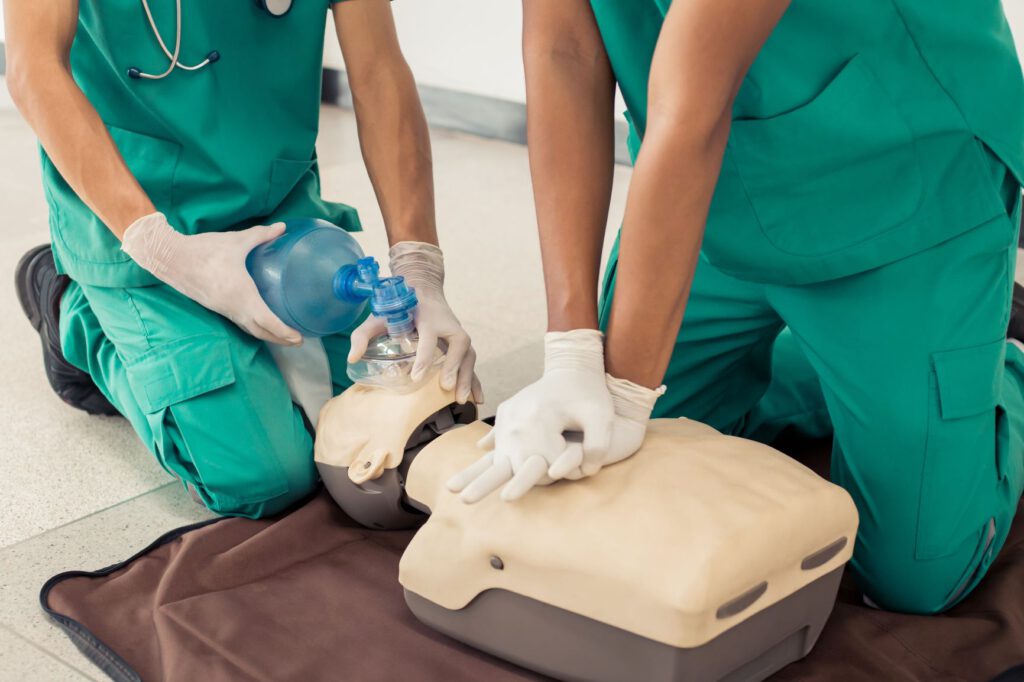Skills for Health and Resuscitation Council UK partnership providing NHS with life-saving digital resuscitation training

As health care professionals continue to encounter COVID-19 challenges in the ongoing delivery of classroom resuscitation training, @SkillsforHealth and Resucitation Council UK have joined forces to develop a new suite of patient-specific digital resources which help underpin the core knowledge required, until it’s safe to return to face-to-face training.
The ‘National Cardiac Arrest Audit 2019/20’¹ reported 13,211 in-hospital cardiac arrests in NHS acute hospitals. Just over half (51.4%) survived the event, and around a quarter (24%) survived to discharge. Cardiopulmonary resuscitation (CPR) vastly increases patient survival of cardiovascular arrests and reduces in-hospital mortality when provided promptly and effectively from adequately trained healthcare professionals. The quality of this training has a clear impact on the efficiency of CPR and consequently on health outcomes.
Given the importance of CPR in delivering effective care and protecting human life, resuscitation training is understandably a mandatory module for all UK healthcare staff, as outlined in the Core Skills Training Framework (CSTF) developed by Skills for Health, the Sector Skills Council for Health. These national learning outcomes, based on Resuscitation Council UK’s (RCUK) Guidelines and Quality Standards for CPR practice and training, propose the minimum frequency of refresher training or assessment as every year. However, the recommendation is also made that every healthcare organisation should determine this exact time period dependent upon role, clinical responsibilities, and local level training audits.
It has been widely evidenced that resuscitation training and competence development should be continuous for many staff groups, with numerous studies observing a significant deterioration of CPR knowledge and skills as early as three months after training. While it is crucial that learning is assessed annually in a classroom setting, a variety of training methods and approaches may be used to plan, and deliver flexibly, any required updates to training.
After the last twelve months of disruption to learning across UK hospitals, the accessibility and availability of digital resources to support the ongoing delivery of critical resuscitation training in 2021 has never been more vital. Who better to provide a solution, than a collaborative partnership between the two expert Council’s responsible for development of the CSTF resuscitation training?
With a shared commitment to improving patient outcomes through the development of better skills, better jobs, and better competencies, Skills for Health and RCUK have joined forces to deliver a new suite of specialised resuscitation eLearning for healthcare professionals: Resuscitation Level 3 – adult resuscitation, Resuscitation Level 2 – maternal resuscitation, and Resuscitation Level 2 – new-born resuscitation.
Paul Tingle, Learning Commercial Product Manager, Skills for Health said:
“Skills for Health welcome this opportunity to work with RCUK in developing this digital learning. Our wealth of experience in supporting and delivering eLearning around the CSTF is further bolstered by being able to produce high quality training in these specialised areas. Being able to produce this training to support staff in these times with the experts in resuscitation practice in the UK is a privilege.”
Solely designed to align with the needs of the NHS clinical workforce, these courses complement and strengthen the CSTF learning outcomes, and importantly support staff at a time when face-to-face learning is still a challenge.
Isabelle Hamilton-Bower and Adam Benson Clarke, Course Managers, RCUK, said
“As the nationally recognised experts in resuscitation practice and authors of the UK’s resuscitation guidelines, RCUK was delighted to work collaboratively with Skills for Health on producing additional digital learning for healthcare workers, which supports practical face-to-face skills learning.”
This range of patient-specific courses provide the core knowledge required by healthcare professionals when managing deterioration and resuscitation. These digital courses have been written by UK leading experts in resuscitation and embed the current RCUK Resuscitation Guidelines.
Isabelle added: “The courses also incorporate an opportunity for self-assessment to ensure understanding of this vital information. In a time-poor clinical environment, these digital resources allow healthcare professionals to access resources at times that are convenient for them.”
Adam said: “Retention of cardiopulmonary resuscitation skills is poor, particularly in those who have little exposure to them. Regular short periods of practice on a manikin are therefore essential to maintain these lifesaving skills. However, the current restrictions associated with the pandemic have resulted in difficulties experienced by health care professionals in accessing resources for continuing resuscitation training. These digital resources help to underpin the theoretical knowledge before attending face-to-face training when safe to do so.”
Find out more here about these new resuscitation eLearning courses, which are available from Skills for Health today.
Source (1) ‘Key statistics from the National Cardiac Arrest Audit 2019/20’











Responses